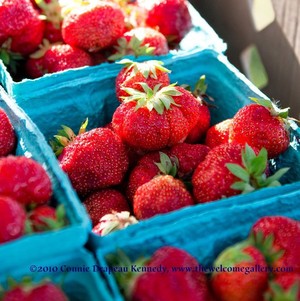07 Jul Tue 2015
A small farm visit
I took a tour of Cretinon’s three sites under tillage and the farm stand with Graham Bouthiller, a 10 year employee. It was fun and enlightening. The farm stand offers much variety from near and far, but when at the Marshfield Farmers’ Market, Cretinon’s offerings are completely different. Like many farmers’ markets, sales are restricted to producer grown items, with a few exceptions for hard to find local items. Cretinon’s grows plenty of vegetables for Marshfield, the two other markets they attend, and supply their farm stand too. David Cretinon and his brother, Rolie, were busy weeding while his sister, Beverly, was working the farm stand during the visit. The stand offers a huge array of produce from near and far, like their own arugula and snap peas to the far away and more tropical avocados and mangos, plus almost everything in between. One can also purchase fresh bread as well as Lovin’ Spoonfull’s jelly, Simpson Springs’ soda, and Jenny D’s honey. These additions help a small farm stand business support their families while offering a one stop shopping experience for customers. The once thriving hotspot for spring flowers and plantings, Cretinon’s home in Kingston, was nearly suffocated with the upsurge of retail giants like Lowes and Home Depot. They had to make business changes for the farm to survive. The greenhouses make room in the spring for starting many vegetables grown at the farm. Container flowers are often started using plugs due to patent restrictions, and some slow-growing herbs, but not the vegetables. Everything is started from non-GMO seed purchased from three New England seed companies. The fields of a small farmer work to maximize yield per square foot with narrow rows inter planted with multiple vegetables and flowers. Luckily Bouthillier pointed out the flower varieties growing from seed, or I would have mistaken them as weeds. Mixed planting is a space saver, reduces weed pressures, and aids in reducing pest damage. This and companion planting methods are often used in organic gardens. Although not an organic farm, Cretinon’s uses some methods in concert with nature. For example, the planting of flowers varieties between vegetables offers both bouquets to sell and hide-outs for beneficial insects like ladybugs. This spring required shoveling the snow off the ground near the high tunnel to plant the peas on April 1st, a later planting date than usual. The continued cold nights delayed tender plantings, giving weeds an advantage. The delays caused ever lengthening to-do lists and the weeds gain ground. All the weeding is done by hand and with a narrow walk behind tiller to fit down the rows. Growing carrots, for example, requires hand weeding 3 or 4 times before they reach marketable size. A remarkable amount of work for the price sold at market. I found myself drooling at the 20 year old asparagus patch now in full feathered greenery and the 100 foot rows of potatoes, squashes, cabbages, kales, tomatoes, and corn. It was disheartening to see the tops of a half row of month-old string bean plants devoured the night before by deer. Luckily multiple succession plantings between the less desirable (for deer) plants assure string bean survival and continual offerings throughout the summer. Bouthillier calls the field trials site his “test kitchen”, growing small 5-20’ rows of new varieties and trialing farming methods without the risk of a failed 100’ row. As an added bonus this means offering both early and unique varieties at the farmers’ market, in small quantity. Cretinon and Bouthillier tried a new method of starting spring carrots and beets, it was a great success resulting in market-size beets and carrots far earlier than other farms. There are also tomatillos, collards, new lettuces and chard carefully protected from the deer in this smaller site. The peach trees and ancient apple trees edge the bottom field, awaiting the next wave of planting. This test site is remote and private with lovely views from the hilltop, appropriately named Valley View Farm. Here the soil is enhanced with chicken manure and the back of the garden had 5’ tall milkweed in full bloom feeding the bees. Cretinon’s has supported the Marshfield Farmers’ Market since inception. The Farmers’ Market restricts produce to 100% local offerings, which means Massachusetts gown. Further restrictions are that it must be producer-grown with few exceptions by permission. Each year Cretinon’s offerings at the market have increasingly become more of their own. Now only a few items (10% or less) are offered which are grown by another farmer, and those must be separate from Cretinon’s own and labeled as to the farm on which grown. This method allows customers greater access to local fruit in particular. At Cretinon’s farm stand in Kingston these restrictions do not apply, thus they can offer a wider array of grocery products and produce, helping to sustain a generations old business in this modern age of warehouse megastores and giant mono-culture farms. The Farm Stand is located at 86 Landing Road in the Kingston near the Duxbury line. But, you can find David Cretinon, and sometimes his fiancé Juli Grzybala, at the Marshfield Farmers’ Market every Friday , where they first met and fell in love!
Lorrie
03:20 PM EDT

